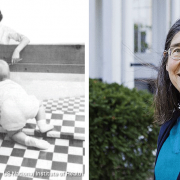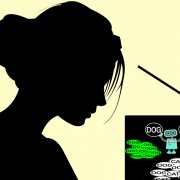May 9, 2023 - 4:00 pm
Singleton Auditorium (46-3002)
Eero Simoncelli, Silver Professor; Professor of Neural Science, Mathematics, Data Science and Psychology, NYU
Abstract: Inference problems in machine or biological vision generally rely on knowledge of prior probabilities, such as spectral or sparsity models. In recent years, machine learning has provided dramatic improvements in most of these problems using artificial neural networks, which are typically...
May 4, 2023 - 11:15 am
Despite the eye-catching claim that large AI language models like ChatGPT have achieved theory of mind, some experts find their abilities lackluster.
By Cody Cottier
When you converse with the latest chatbots, it’s easy to feel like they get you. Their deft responses often give an undeniable impression that they’re aware not only of what you say, but of what you think — what your words imply about your mental state.
Theory of Mind
Among...
May 2, 2023 - 4:00 pm
Singleton Auditorium (46-3002)
Jeff Clune, Associate Professor, Computer Science, University of British Columbia; Canada CIFAR AI Chair and...
Abstract: Quality Diversity (QD) algorithms are those that seek to produce a diverse set of high-performing solutions to problems. I will describe them and a number of their positive attributes. I will summarize how they enable robots, after being damaged, to adapt in 1-2 minutes in order to...
April 29, 2023 - 3:00 pm
by Elizabeth Elkind
EXCLUSIVE: House Speaker Kevin McCarthy is launching an effort to get members of Congress educated on artificial intelligence, as the rapidly advancing technology enters more facets of everyday life and pressure to regulate it grows.
Against the backdrop of hours of tense negotiations that ultimately led to House Republicans passing their debt limit bill earlier this week, lawmakers took time this week to hear from two MIT-...
April 25, 2023 - 4:00 pm
Singleton Auditorium (46-3002)
Leila Wehbe, Carnegie Mellon University
Abstract: Aligning neural network representations with brain activity measurements is a promising approach for studying the brain. However, it is not always clear what the ability to predict brain activity from neural network representations entails. In this talk, I will describe a line of work...
April 21, 2023 - 9:30 am
A new study tests an alternative to external stimulation for measuring when subjects lose and regain responsiveness during sedation and anesthesia.
David Orenstein | Picower Institute for Learning and Memory
Studies of consciousness often run into a common conundrum of science — it’s hard to measure a system without the measurement affecting the system. Researchers assessing consciousness, for instance as volunteers receive anesthesia,...
April 11, 2023 - 4:00 pm
Singleton Auditorium (46-3002)
Elizabeth Spelke, Harvard University
Abstract: More than two decades after her death, Eleanor Gibson still may be the best experimental psychologist ever to work in the developmental cognitive sciences, yet her work appears to have been forgotten, or never learned, by many students and investigators today. Here, drawing on three of...
April 4, 2023 - 4:00 pm
Singleton Auditorium (46-3002)
Panelists: Ev Fedorenko, Sydney Levine, Josh Tenenbaum, Phillip Isola, Martin Schrimpf;Moderator: Tommy Poggio
Abstract: Transformer models have been rapidly gaining popularity as they underlie some of the most advanced deep learning systems to date. Despite their apparent successes, several...
Abstract: Transformer models have been rapidly gaining popularity as they underlie some of the most advanced deep learning systems to date. Despite their apparent successes, several...
March 28, 2023 - 4:00 pm
McGovern Reading Room (46-5165)
H. N. Mhaskar - Claremont Graduate University, Claremont.
The fundamental problem of machine learning is often formulated as the problem of function approximation. For example, we have data of the form {(xj,yj)}, where yj is the class label for xj, and we want to approximate the class label as a function of the input x. The standard way for this...
March 27, 2023 - 11:15 am
by Jennifer Michalowski
Artificial intelligence seems to have gotten a lot smarter recently. AI technologies are increasingly integrated into our lives — improving our weather forecasts, finding efficient routes through traffic, personalizing the ads we see and our experiences with social media.
But with the debut of powerful new chatbots like ChatGPT, millions of people have begun interacting with AI tools that seem convincingly human-like....
March 21, 2023 - 4:00 pm
Singleton Auditorium (46-3002)
Chiyuan Zhang, Google
Abstract: Deep learning algorithms are well-known to have a propensity for fitting the training data very well and memorize idiosyncratic properties in the training examples. From a scientific perspective, understanding memorization in deep neural networks shed light on how those models generalize...
Researchers Crack Open Machine Learning's Black Box to Shine a Light on Generalization [hackster.io]
March 10, 2023 - 12:00 pm
Flying in the face of recent rival studies, these scientists point to generalization as key to order-of-magnitude performance gains
by Gareth Halfacree
Researchers from the Massachusetts Institute of Technology (MIT) and Brown University have taken steps to open up the "black box" of machine learning — and say that the key to success may lie in generalization.
"This study provides one of the first theoretical analyses covering optimization,...
March 8, 2023 - 3:30 pm
MIT researchers uncover the structural properties and dynamics of deep classifiers, offering novel explanations for optimization, generalization, and approximation in deep networks.
A new study from researchers at MIT and Brown University characterizes several properties that emerge during the training of deep classifiers, a type of artificial neural network commonly used for classification tasks such as image classification, speech recognition...
February 28, 2023 - 5:30 pm
It teamed up with biometrics research company MindProber to study its users.
By Charlotte Hu
Think about the music and podcasts you listen to, and how they affect your mood. If streaming audio content makes you happier, you’re not alone, and the proof is in the study data Spotify released today.
That finding comes courtesy of 426 free-tier Spotify users who volunteered to wear an electrodermal activity sensor on their palm any time they tuned in...
February 28, 2023 - 4:00 pm
McGovern Reading Room (46-5165)
Meenakshi Khosla (Kanwisher lab postdoc)
Abstract: Neuroscience is currently undergoing an explosion in the availability of large-scale brain activity data, so the major challenge no longer lies in data collection, but also in deriving understanding from this abundant stream of complex, high-dimensional, noisy data with methods that fully...














